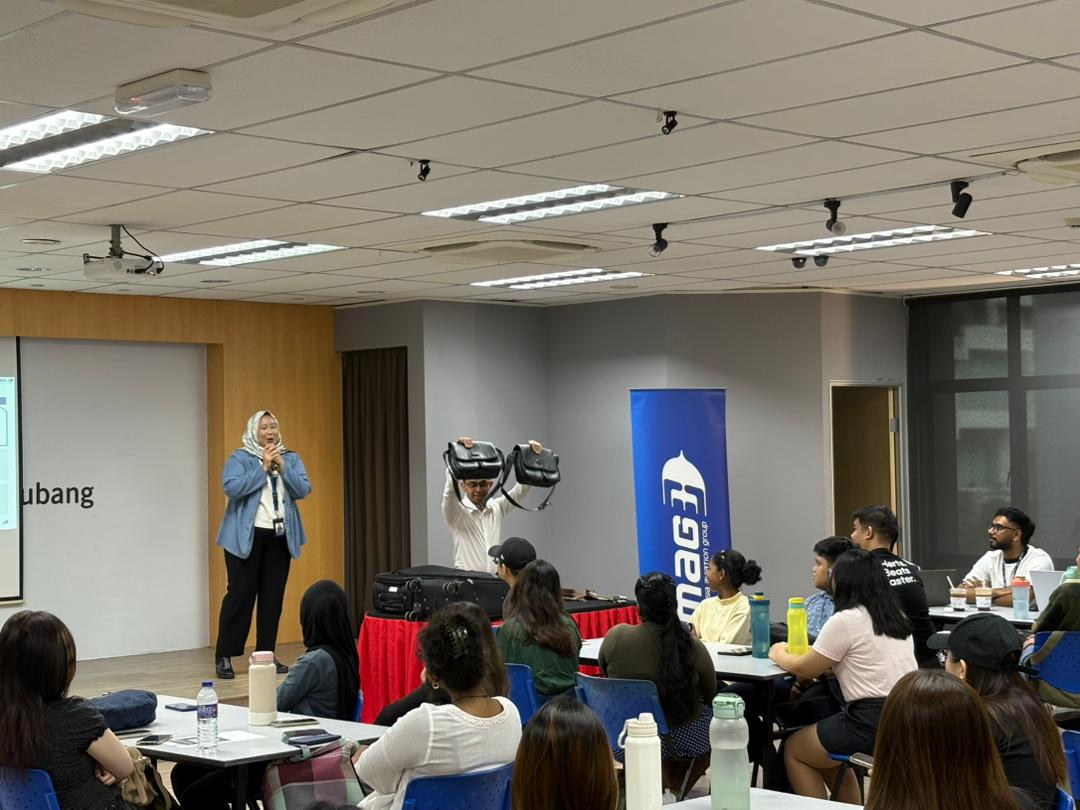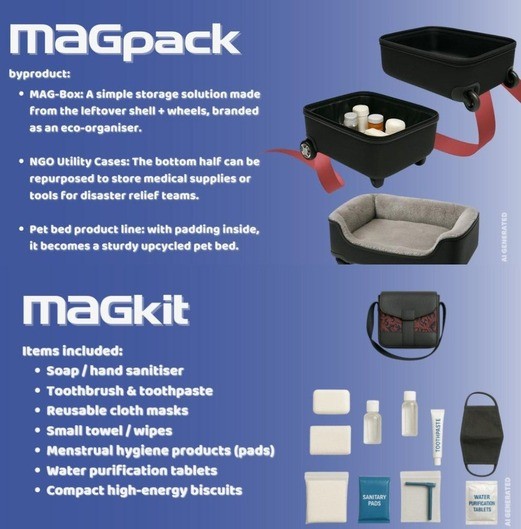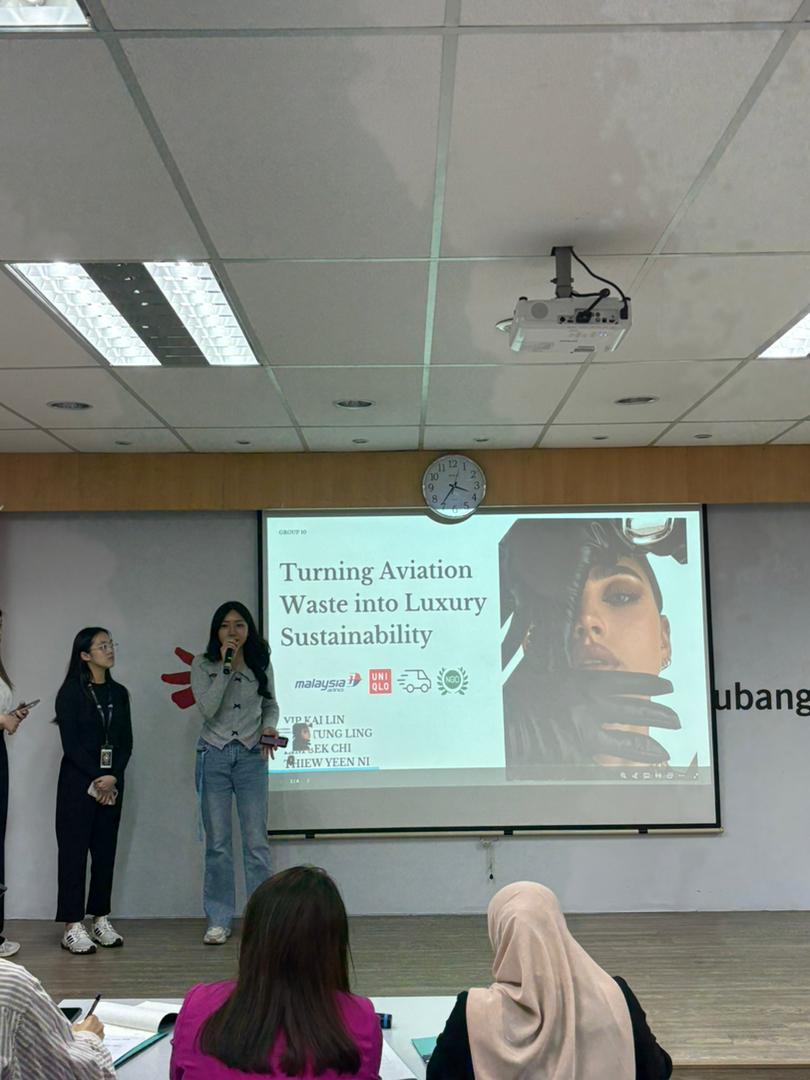INTI has partnered with Malaysia Aviation Group (MAG) and the University of Hertfordshire (UH) to organise the 2025 Upcycling Hackathon, an event that challenged students to transform aviation waste into innovative, market-ready products.

MAG representatives from the Group Sustainability Office showcase discarded items that were later repurposed by students into innovative product designs.
The hackathon, themed ‘From Cabin to Commerce (C2C): Upcycling Aviation Materials into Market-Ready Products,’ generated significant interest among UH students across four programmes—Marketing (BAMUH), Business Administration (BBDUH), Advertising and Digital Marketing (BAVDM), and Mass Communications (BMCUH). A total of 80 students formed 10 teams, each striving to develop sustainable products and aiming to win the top prize of five sponsored tickets to Langkawi..
Innovation Through Sustainability
Airlines face a constant challenge in managing discarded items like seatbelts, luggage, and crew uniforms. By giving these materials to students, the hackathon turned waste into a platform for both learning and innovation. It encouraged participants to look beyond disposal and imagine new commercial value.
Setting the tone for the day, Eric Lee, Academic Dean of INTI International College Subang (IICS), reminded students of the bigger picture: “You are learning how ideas can become solutions, how teamwork drives innovation, and how sustainability is reshaping business everywhere.”
His message framed the competition as a space where creativity and practicality must coexist.
Industry Engagement
That balance of imagination and application was reinforced through MAG’s active involvement. Representatives from its Group Sustainability Office offered students with insights throughout the day, ensuring that ideas stayed aligned with industry realities.
Noor Hazwan Noor Hazin, Senior Manager at MAG’s Group Sustainability Office, explained why such collaborations matter: “MAG has worked with various industry players over the years to achieve the globally ambitious Net Zero goal. From our Research and Development perspective, university and college students are key innovators who spark fresh, creative ideas.”
He added, “Young people today are incredibly up to date with trends and technology. We expect students to present new, realistic approaches that can be applied within the aviation industry, clearly demonstrating how their ideas translate into practical solutions.”
With industry experts present, students were not only competing but also assessing their work against the standards of professionals who face sustainability challenges daily.
Students Step Up to the Challenge
That guidance gave the competition floor a strong sense of purpose. Despite the limited time and resources, the atmosphere buzzed with energy as teams sketched, designed, and refined their proposals. Materials ranged from retired luggage and crew handbags to discarded seatbelts, and the results demonstrated both creativity and commercial awareness.
Some teams suggested transforming old luggage into stylish pet carriers, while others repurposed crew handbags into winter gloves for travellers heading to colder destinations. Each idea showed how sustainability could connect with consumer needs. Presentations were made confidently, as students combined design thinking with strategy and storytelling to persuade the judges.

The MAGkit and MAGpack, developed by Team MAGnitude, won over the judges and secured the top prize of five Langkawi tickets.
Winning Ideas
The highlight of the hackathon came from Team MAGnitude, led by Denise Teh Wen Wei. Their products stood out for practicality and relevance:
• MAGkit: A disaster survival sanitation kit crafted from crew leather bags and uniforms, stocked with essentials supplied by NGO partners.
• MAGpack: A slim laptop backpack made from suitcase tops, featuring seatbelt straps and an optional leather sling strap.
Reflecting on the team’s achievement, Denise said, “We weren’t expecting to win at all. Our focus was to create something practical, low-cost, and aligned with the Sustainable Development Goals.”
Judges praised the products for being creative yet realistic, scalable, and in line with CSR and NGO needs, qualities that made them stand out in a highly competitive field.
Pathways Beyond the Competition
The value of the hackathon extended beyond the products themselves. MAG representatives emphasised that students demonstrating business acumen and analytical skills—qualities evident throughout the event—would be well-positioned for future internships and career opportunities.
“While MAG has diverse teams and departments, we look for interns who demonstrate strong business acumen and analytical skills—qualities that are often underdeveloped in traditional classroom settings,” Hazwan noted.
For INTI, this was exactly the kind of outcome it strives for. By linking students directly with major industry players, the institution ensures that education extends beyond classrooms and into the realities of global business.

Teams pitch their solutions with confidence, demonstrating creativity, teamwork, and entrepreneurial drive.
Education With Impact
The 2025 Upcycling Hackathon gave students the chance to tackle sustainability challenges head-on, apply their entrepreneurial skills under pressure, and present their ideas to industry experts.
For INTI, the event reaffirmed its belief that education has the most significant impact when it is practical, relevant, and connected to real-world challenges. With partners like MAG and UH, INTI continues to nurture graduates who combine creativity with responsibility—qualities essential for the next generation of leaders